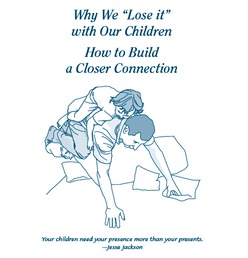|
Special Time is not easy. We want to give our children our undivided attention and love but we are pulled in a million directions. The busy mind defies our attempts to let go into presence. It will argue that there are so many other things that need to get done, how in the world can we just relax and play with our child? There are other challenges too. Sometimes we find we are just plain bored with our child’s play. One parent working hard on creating Special Time lamented about how she couldn’t stand to play cars with her son one more time! It didn’t make sense to her why he needed to continue this monotonous play and it didn’t feel special. As adults we are trying hard to figure out the meaning of our child’s play and to validate that this time we are spending is worth it. The question we are really asking in these moments is “Am I enough?” For how could just our bare attention to our child’s meaningless play really be that important? IT IS. Your loving, joyful attention is so important for your child. Most of us did not have parents that showered us with this kind of special attention on a regular basis. We were told to occupy ourselves in play outside of adults’ important time. If we had an achievement, an external product we created, that might be worthy. “Look at my picture, daddy!” “Watch my cartwheel mommy!” But if we just were, just being, not doing or producing anything particular, that was not worthy of attention, or so that was the message we absorbed. And this is reinforced again and again in our society. We are told: “If I cannot give an explanation of how what I am doing is valuable, then it is not important.” We ask ourselves: “Is my attention really that important to my kid when she is playing?” Then when your child plays at your feet and you do all you can to follow her thread of play, but can’t keep track of why it’s important, you feel adrift. Your mind wanders. You don't realize your importance. Sometimes when we give our kids this special attention, it is more than just vacancy or boredom that arises. Sometimes deep feelings of pain surface. If you have experienced hurt in childhood then giving the equal amount of love to your children reminds that inner part of you just what was missed, and how you longed for it. This is where getting our own support as parents is integral. Listening Partnerships allow parents to release their difficult emotions about parenting and hurts from the past, so that our minds are more free to be with our children. There is a saying that goes, “You need to feel it to heal it.” Talking with a trusted other can help you feel that boredom, irritation, the pains of how you were hurt, and your utter deservingness of love and attention. And in feeling it in this safe and time-limited space you can release a quantum packet of energy that can now be freed up for more productive and creative purposes in your life, including giving your full presence to your child at play. To create a listening partnership do the following: 1) Call, text or email a person (parent or not) who you feel more or less comfortable with 2) Say you would like to create a listening partnership in which you can both share the frustrations of parenting and life (and share this post with them) 3) Set a time to talk, skype, or meet in a private space (the car works great for phone listening partnerships) 4) Set a timer for 5-20 minutes, depending on what you have 5) During that time one person talks, cries, demands, pounds, shakes, groans, growls, etc and the other person listens, encourages, and reminds the other that they and their feelings are important and will be listened to with full attention (a simple “I am right here.” and “Keep going” is usually enough) 6) When the timer goes off, ask a random question, like “What’s your favorite holiday drink?” or “Name 5 cereals” to get the speaker’s mind back to the present 7) Switch listeners and repeat. Remember to ask the random question at the end. 8) After the question say goodbye. Don’t ask about their life. Don’t bring up what they talked about. Don’t talk more about what you talked about. Save it for your next listening time. If you would like to explore how to create listening partnerships in more depth I recommend this self-guided class by Hand in Hand Parenting.
1 Comment
Sometimes we lose it on our kids. We don’t want to. We want to be loving, caring, parents present to our children’s challenges and helping them learn better ways. But sometimes we just don’t know what to do and we find ourselves relying on things our parents did, that we hoped to do better. We aren’t bad parents, we just don’t know how to keep it together in those tense, stressful moments.  Building Emotional Understanding Booklet from Hand in Hand Parenting Building Emotional Understanding Booklet from Hand in Hand Parenting According Patty Wipfler, founder of Hand in Hand Parenting and author of “Why we ‘lose it’ with our children in the “Building Emotional Understanding” booklets: “When you were a child, chances are that your parents did not hold you and listen to you warmly when you needed to cry. They probably were not kind when you had tantrums. And they may have forbidden the wild play that made you and other children laugh and feel powerful. They loved you, but the main parenting ideas available to them were based on controlling a child’s emotions by threat or by force. So it’s likely that many of the feelings you had as a child are still waiting to be heard. Your limbic system manages the memories that contain those unheard feelings, keeping them under wraps when you feel connected and competent. When you face challenges or you are tired, you run out of energy to guard those feelings. Then, your stored upsets are easily triggered.”  Brain research in "Parenting from the Inside Out" by Daniel Siegel, MD and Mary Hartzell, Ed.D. lets us know that: "When caring for children, it is inevitable that our own leftover issues will become activated in our minds….making it difficult to think clearly...and creat(ing) obstacles to collaborative communication with our children." (p.163-4) Even if we are not completely taken over by restimulated emotions from the past, our perceptions of what is happening may be subtly biased and we might find it difficult to find creative ways to solve the problems our children confront us with. There are myriad ways to address these stored feelings: everything from exercise, time with friends, alone time, therapy and other stress-relieving activities. But to truly release the feelings we need to vent. My definition of venting is: allowing yourself to feel and express all your feelings uncensored (even from your own internal sensor, who is the most judgmental of all!). No one wants to be a complainer, especially in this world of gratitude journals and above-all-negativity spirituality. And we certainly don't want to blame or unleash anger on anyone (which is hurtful and damaging). But to be human is to have experienced frustrations, disappointments, helplessness, confusion, shock, anger, worthlessness, the list goes on and on! We need to vent these feelings! Otherwise they stay unprocessed in the brain's limbic system. Venting is different from complaining in three major ways:
1- You know that your feelings are connected to old hurts from the past (even if you don’t believe it in the moment). 2- You and your listener are consciously choosing to vent in order to feel and release feelings (It is a planned vent, instead of just complaining or losing it on a whim). 3- You are using your venting to feel and release as much as possible (as opposed to avoiding the feelings, which is what complaining does). You vent with an adult so you don’t “leak” that vent (aka “lose it!”) with your children. You may still want them to change their behavior, you may still want more from your spouse, and you can have all those changes! In fact, after venting your ability to have the conversations and make the changes needed happen will be much easier as your limbic system will be freed up from the stuck emotions. So here’s your call to action: Find a friend who will do this kind of venting with you. Set up a time and set a timer. For the first half you vent and your partner just listens; no advice, no suggestions, just heartfelt listening to those buried feelings. Then switch. That’s it. Then notice how your days are different over time. This is the basis of the Hand in Hand Parenting Tool called Listening Partnerships. |
AuthorKaren Wolfe, MFT is a psychotherapist in San Francisco and the East Bay. She is passionate about helping children and families thrive and has particular expertise with children with exceptional learning and sensory styles. Archives
August 2016
Categories
All
|
|
2354 Post St, Suite B,
San Francisco, 94115 |
3655 Grand Avenue,
Oakland, CA 94610 |
Greenwood Court,
Orinda, CA 94563 |
